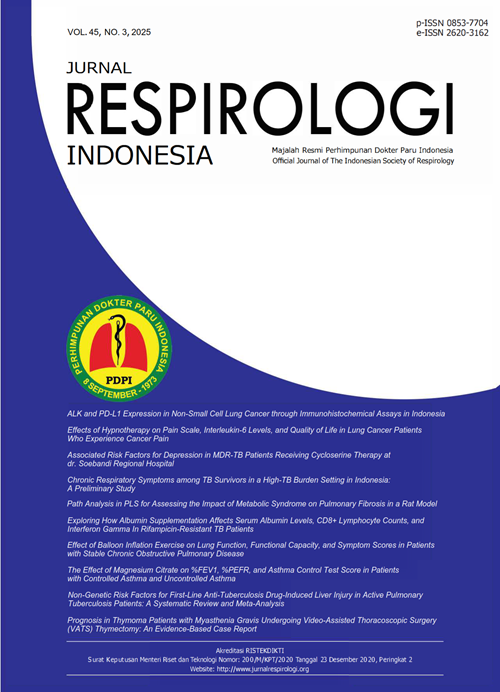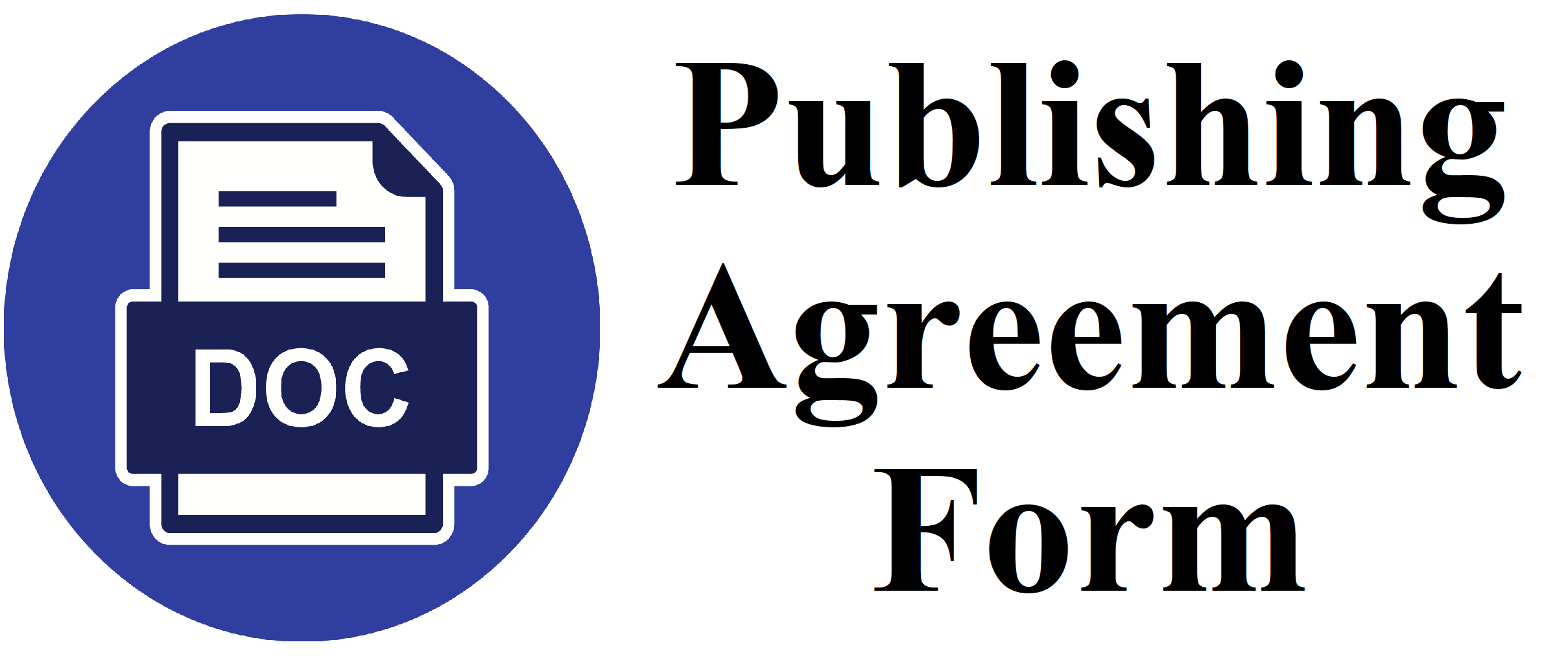Effects of Hypnotherapy on Pain Scale, Interleukin-6 Levels, and Quality of Life in Lung Cancer Patients Who Experience Cancer Pain
DOI:
https://doi.org/10.36497/jri.v45i3.624Keywords:
hypnotherapy, interleukin-6, pain scale, quality of lifeAbstract
Background: Pain is a common symptom in lung cancer patients and can affect their quality of life. Interleukin 6 (IL-6) plays a role in malignant cell proliferation and differentiation as well as the initiation and persistence of cancer pain. Hypnosis can reduce pain by reducing anxiety through relaxation and/or directly affecting neurophysiological activity that underlies the subjective experience of pain. This study aimed to evaluate hypnotherapy as a non-pharmacological method for managing cancer pain.
Methods: Clinical trial of 30 subjects with quasi-experimental pre-test and post-test in treatment and control groups of lung cancer patients of NSCLC and SCLC stage III and IV who experienced cancer pain with pain scale ≥3 at RSUD Dr. Moewardi Surakarta in June to August 2023 with a consecutive sampling method. The treatment group received hypnotherapy intervention for 4 weeks. Subjects were assessed for pain scale, interleukin-6 levels, and FACT-L quality of life questionnaire.
Results: A 4-week hypnotherapy intervention can significantly reduce the pain scale (P=0.0001) and improve the quality-of-life FACT-L (P=0.002) in lung cancer patients experiencing cancer pain. Hypnotherapy also significantly reduced IL-6 in the treatment group (P=0.008), but when compared with the control, the results were not significant (P=0.345).
Conclusion: Hypnotherapy may reduce the pain scale and improve the quality of life of lung cancer patients who experience cancer pain, but does not significantly lower IL-6 levels.
Downloads
References
1. World Health Organization. WHO report on cancer : Setting priorities, investing wisely and providing care for all. Geneva: World Health Organization; 2020.
2. World Health Organization. Cancer Indonesia 2020 country profile. 2020.
3. Deng G. Integrative medicine therapies for pain management in cancer patients. Cancer Journal (United States). 2019;25(5):343–8.
4. Zhang B, Li X, Ma Z, Zhang S, Song X, Gao H, et al. Prevalence and management of pain in lung cancer patients in northern China: A multicenter cross-sectional study. Thorac Cancer. 2022;13(11).
5. Russo MM, Sundaramurthi T. An overview of cancer pain: epidemiology and pathophysiology. Semin Oncol Nurs. 2019;35(3):223.
6. Vendrell I, Macedo D, Alho I, Dionísio MR, Costa L. Treatment of cancer pain by targeting cytokines. Mediators Inflamm. 2015;2015:984570.
7. Kumari N, Dwarakanath BS, Das A, Bhatt AN. Role of interleukin-6 in cancer progression and therapeutic resistance. Tumor Biology. 2016;37(9):11553–115.
8. World Health Organization. WHO guidelines for the pharmacological and radiotherapeutic management of cancer pain in adults and adolescents. 2018.
9. Sharma V, Pandya P, Kumar R, Gupta G. Evaluation of hypnotherapy in pain management of cancer patients: A clinical trial from India. Indian Journal of Pain. 2017;31(2):100–6.
10. Sharma V. Hypnotherapy in cancer care: Clinical benefits and prospective implications. Journal of Health Research and Reviews. 2017;4(3):96–103.
11. Prasetya H, Kusumawati HN, Wardiyatmi W. The effectiveness of hypnotherapy in reducing pain in patients with cervical cancer. Indonesian Journal Of Medicine. 2021;6(2):152–8.
12. Schoen M, Nowack K. Reconditioning the stress response with hypnosis CD reduces the inflammatory cytokine IL-6 and influences resilience: A pilot study. Complement Ther Clin Pract. 2013;19(2):83–8.
13. Perhimpunan Dokter Paru Indonesia. Kanker paru: Pedoman diagnosis dan penatalaksanaan di Indonesia. 1st ed. Syahruddin E, Jusuf A, editors. Jakarta: UI Press; 2018. 1–3 p.
14. Thandra KC, Barsouk A, Saginala K, Aluru JS, Barsouk A. Epidemiology of lung cancer. Wspolczesna Onkologia. 2021;25(1):45–52.
15. Sung H, Ferlay J, Siegel RL, Laversanne M, Soerjomataram I, Jemal A, et al. Global Cancer Statistics 2020: GLOBOCAN estimates of incidence and mortality worldwide for 36 cancers in 185 countries. CA Cancer J Clin. 2021;71(3):209–49.
16. Bihar S, Hasibuan P, Soeroso N. Pendahuluan. In: Soeroso N, Hasibuan P, Tarigan S, Bihar S, editors. Kanker paru: Diagnosis dan penatalaksanaan. 1st ed. Medan: USU Press; 2017. p. 1–6.
17. Torre LA, Siegel RL, Jemal A. Lung cancer statistics. Adv Exp Med Biol. 2016;893:1–19.
18. Kim B, Park EY, Kim J, Park E, Oh JK, Lim MK. Occupational exposure to pesticides and lung cancer risk: A propensity score analyses. Cancer Res Treat. 2022;54(1):130–9.
19. National Cancer Institute. Cancer pain [Internet]. 2022 [cited 2022 Nov 29]. Available from: https://www.cancer.gov/about-cancer/treatment/side-effects/pain/pain-pdq
20. McCaffrey D, Lawther AJ, Weickert CS, Walker AK. Cancer activates microglia to the same extent as chronic stress throughout stress neurocircuitry in a mouse model of breast cancer. Psychoneuroendocrinology. 2022;146:105938.
21. Dillworth T, Mendoza ME, Jensen MP. Neurophysiology of pain and hypnosis for chronic pain. Transl Behav Med. 2012;2(1):65–72.
22. Nees F, Löffler M, Usai K, Flor H. Hypothalamic-pituitary-adrenal axis feedback sensitivity in different states of back pain. Psychoneuroendocrinology. 2019;101:60–6.
23. Vachon-Presseau E. Effects of stress on the corticolimbic system: Implications for chronic pain. Prog Neuropsychopharmacol Biol Psychiatry. 2018;87:216–23.
24. Generaal E, Vogelzangs N, Macfarlane GJ, Geenen R, Smit JH, Penninx BW, et al. Reduced hypothalamic-pituitary-adrenal axis activity in chronic multi-site musculoskeletal pain: Partly masked by depressive and anxiety disorders. BMC Musculoskelet Disord. 2014;15(1):227.
25. Eaton LH, Beck SL, Jensen MP. An audio-recorded hypnosis intervention for chronic pain management in cancer survivors: A randomized controlled pilot study. International Journal of Clinical and Experimental Hypnosis. 2021;69(4):422–40.
26. Scardino A. Hypnosis and Cortisol: The Odd Couple. MOJ Immunol. 2014;1(2):0012.
27. Császár-Nagy N, Bókkon I. Hypnotherapy and IBS: Implicit, long-term stress memory in the ENS? Heliyon. 2023;9(1):E12751.
28. Bahreini M, Safaie A, Mirfazaelian H, Jalili M. How much change in pain score does really matter to patients? American Journal of Emergency Medicine. 2020;38(8):1641–6.
29. Olsen MF, Bjerre E, Hansen MD, Hilden J, Landler NE, Tendal B, et al. Pain relief that matters to patients: Systematic review of empirical studies assessing the minimum clinically important difference in acute pain. BMC Med. 2017;15(1):35.
30. Mantovani A, Allavena P, Sica A, Balkwill F. Cancer-related inflammation. Nature. 2008;454(7203):436–44.
31. Ahmad MH, Rizvi MA, Fatima M, Chandra Mondal A. Pathophysiological implications of neuroinflammation mediated HPA axis dysregulation in the prognosis of cancer and depression. Mol Cell Endocrinol. 2021;520:111093.
32. Jehn CF, Kühnhardt D, Bartholomae A, Pfeiffer S, Schmid P, Possinger K, et al. Association of IL-6, hypothalamus-pituitary-adrenal axis function, and depression in patients with cancer. Integr Cancer Ther. 2010;9(3):270–5.
33. McElvaney OJ, Curley GF, Rose-John S, McElvaney NG. Interleukin-6: Obstacles to targeting a complex cytokine in critical illness. Lancet Respir Med. 2021;9(6):643–54.
34. Cohen L, Keegan A, Melanson SEF, Walt DR. Impact of clinical sample handling and processing on ultra-low level measurements of plasma cytokines. Clin Biochem. 2019;65:38–44.
35. Siagian D, Soeroso NN, Sinaga BYM, Eyanoer PC. Perbedaan kadar serum interleukin-6 pada pasien kanker paru dan orang sehat di Medan. Jurnal Respirologi Indonesia. 2021;41(1):28–32.
36. Chen J, Li X, Huang CL, Lin Y, Dai Q. Change of serum inflammatory cytokines levels in patients with chronic obstructive pulmonary disease, pneumonia and lung cancer. Technol Cancer Res Treat. 2020;19:1533033820951807.
37. Lesmana CBJ. Spiritual-hypnosis assisted therapy menurunkan gejala klinis posttraumatic stress disorder, interleukin-6 dan kadar kortisol. [Bali]: Universitas Udayana; 2012.
38. Rodriguez C, Ji M, Wang HL, Padhya T, Mcmillan SC. Cancer pain and quality of life. Journal of Hospice and Palliative Nursing. 2019;21(2):116–23.
39. Téllez A, Juárez-García DM, Jaime-Bernal L, Medina De la Garza CE, Sánchez T. The effect of hypnotherapy on the quality of life in women with breast cancer. Psychology in Russia: State of the Art. 2017;10(2):228–40.
40. Forester-Miller H. Self-hypnosis classes to enhance the quality of life of breast cancer patients. American Journal of Clinical Hypnosis. 2017;60(1):18–32.
Downloads
Published
Issue
Section
License
Copyright (c) 2025 Diana Widyasanti, Yusup Subagio Sutanto, Debree Septiawan, Jatu Aphridasari, Reviono

This work is licensed under a Creative Commons Attribution-ShareAlike 4.0 International License.
- The authors own the copyright of published articles. Nevertheless, Jurnal Respirologi Indonesia has the first-to-publish license for the publication material.
- Jurnal Respirologi Indonesia has the right to archive, change the format and republish published articles by presenting the authors’ names.
- Articles are published electronically for open access and online for educational, research, and archiving purposes. Jurnal Respirologi Indonesia is not responsible for any copyright issues that might emerge from using any article except for the previous three purposes.
















